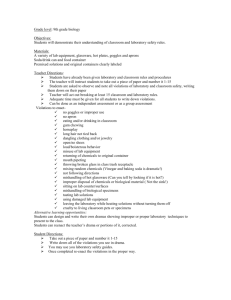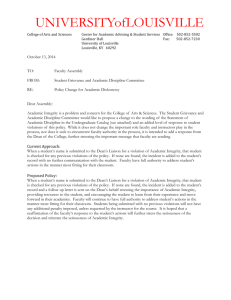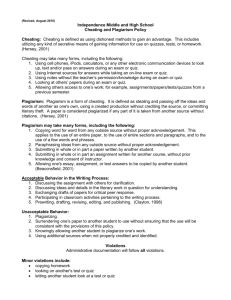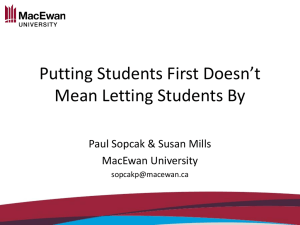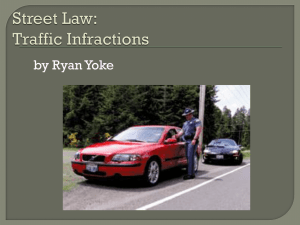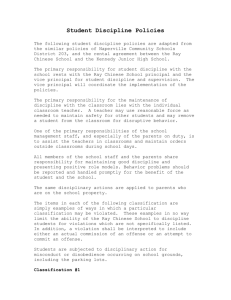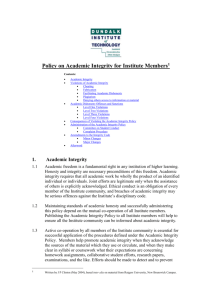ACADEMIC INTEGRITY POLICY
advertisement
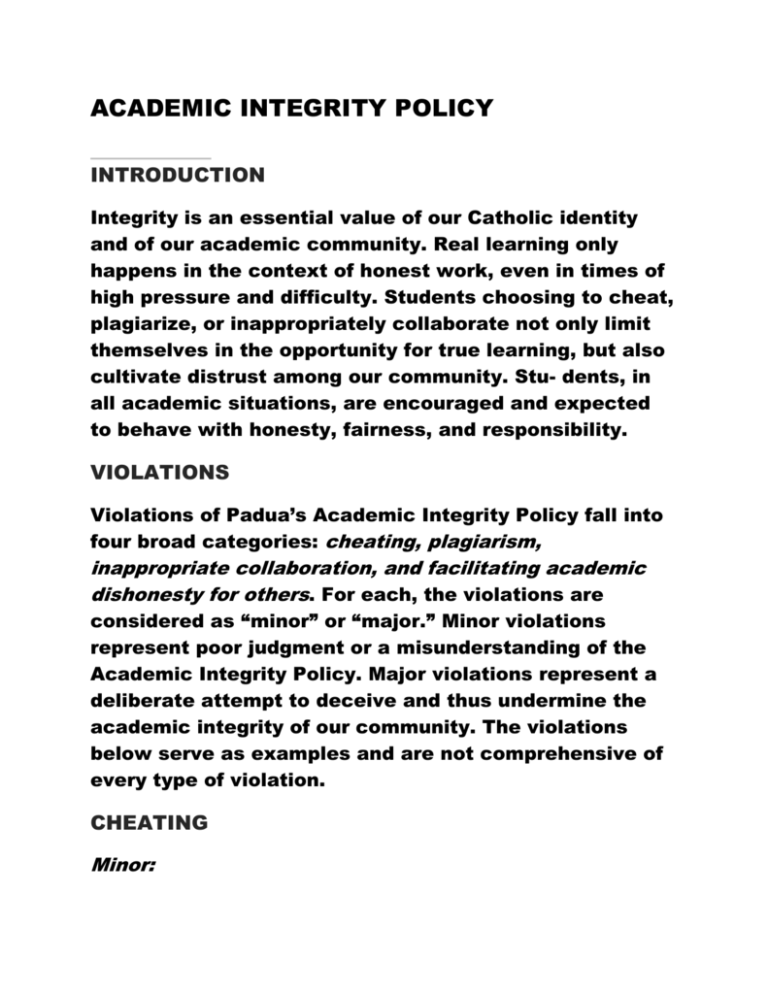
ACADEMIC INTEGRITY POLICY INTRODUCTION Integrity is an essential value of our Catholic identity and of our academic community. Real learning only happens in the context of honest work, even in times of high pressure and difficulty. Students choosing to cheat, plagiarize, or inappropriately collaborate not only limit themselves in the opportunity for true learning, but also cultivate distrust among our community. Stu- dents, in all academic situations, are encouraged and expected to behave with honesty, fairness, and responsibility. VIOLATIONS Violations of Padua’s Academic Integrity Policy fall into four broad categories: cheating, plagiarism, inappropriate collaboration, and facilitating academic dishonesty for others. For each, the violations are considered as “minor” or “major.” Minor violations represent poor judgment or a misunderstanding of the Academic Integrity Policy. Major violations represent a deliberate attempt to deceive and thus undermine the academic integrity of our community. The violations below serve as examples and are not comprehensive of every type of violation. CHEATING Minor: Talking during a test or quiz. Looking at another student’s test or quiz during the testing period. Major: Stealing, reproducing, circulating or otherwise gaining access to a quiz, test or homework materials prior to the time authorized by the teacher. Having in one’s immediate possession unauthorized notes, books, calculators, phones, photos, computers, social media, websites, or other aids during a quiz or test. Altering graded work and then resubmitting it for a new grade. Providing false information about reasons for class absences or late work when requesting a make-up quiz or test or an extension for homework. Using an unauthorized website or app, such as an online translator, to complete homework or other assignments. PLAGIARISM Minor: Using the words, sentences, arguments, rhetorical structures, and ideas of another without proper citation and acknowledgment. Copying data, facts, graphs, computer programs, spread- sheets, images, photos, film/video, or other materials and using them without proper citation or acknowledgment. Copying homework or classwork from an answer key, solution manual, textbook, web site, or other items from an- other student, thus presenting another’s work as your own. Failing to give appropriate credit to source material, whether quoted, summarized, or paraphrased. Major: Copying quiz or test answers from an answer key, solution manual, textbook, web site, or other items from another student, thus presenting another’s work as your own. Copying a majority of another’s work on a larger assessment such as a project, presentation, paper, or lab and presenting this work as your own. Purchasing or copying a paper from a website, another student, or another resource and presenting this work as your own. Fabricating quotations and/or sources. INAPPROPRIATE COLLABORATION Minor: Receiving help with homework, reports, labs, upcoming tests, or other activities when not allowed by the teacher. Accepting credit for a group project without doing your share of the work. Dividing an assignment in various parts and only doing a selected part of the work while taking credit for contributing to the whole. Major: Submitting as one’s own work any material “shared” via any physical or electronic means by another student. FACILITATING ACADEMIC DISHONESTY FOR OTHERS Minor: Allowing another student to use past homework assignments, papers, labs, or similar items. Sharing such material as homework, reports, labs, and/or test information with another student when told collabora- tion is not allowed. Helping others with their homework or other assignments when not allowed by the teacher. Major: Writing a paper for another student. Allowing or helping another student to look at your test or quiz during a test. Sharing with other students your notes, books, calculators, phones, photos, computers, social media, websites, or other aids during a quiz or test Providing any materials, information, or assistance to another person with the knowledge or reasonable expectation that such would be used for dishonest purposes. CONSEQUENCES OF ACADEMIC INTEGRITY VIOLATIONS Students who choose to disregard the integrity expectations at Padua Academy are subject to a variety of consequences, both major and minor. CONSEQUENCES OF MINOR VIOLATIONS Minor violations will result in disciplinary action determined by the teacher. At minimum, students will receive a detention and a maximum of 65% credit for the assignment or evalua- tion in question, even if the work is completely redone. The student’s name will be reported to administration. Teachers may also choose additional disciplinary measures, which may include requesting school administration and/or the Academic Integrity Committee to recommend appropriate consequences. CONSEQUENCES OF MAJOR VIOLATIONS Major violations will result in disciplinary action determined by the administration and/or the Academic Integrity Commit- tee. Teachers are not permitted to determine the consequences in these cases. At minimum, students will receive the appropriate level of demerit and a maximum of 60% credit for the assignment or evaluation in question. The offending student’s parents will be contacted for all major violations. THE ACADEMIC INTEGRITY COMMITTEE The convening of the Academic Integrity Committee, comprised of one administrator and three teachers, can be requested by an administrator, a teacher, a student, or a student’s parent to consider any major violation. The committee will meet with both the student and the teacher and will consider the nature of the violation. The consequences determined by the committee are final and cannot be appealed. This version of the Academic Integrity Policy was approved in May 2014. Any updates to the policy will be posted on paduaacademy.org.

